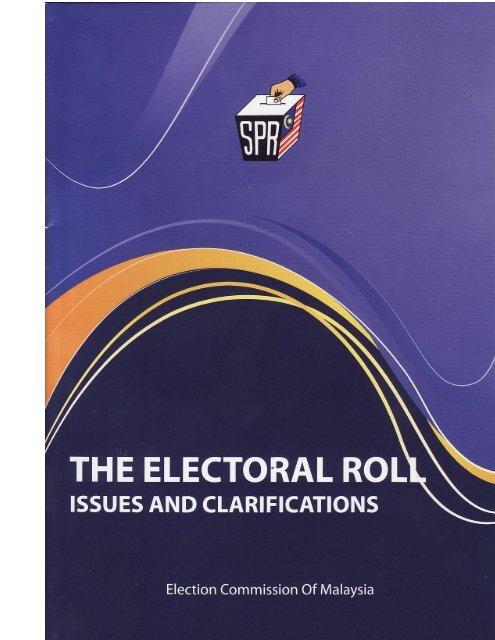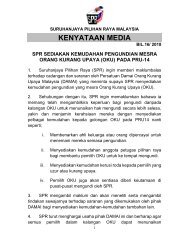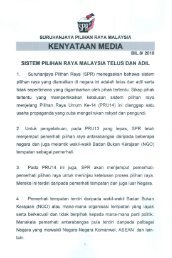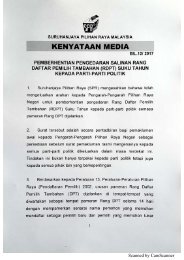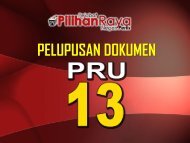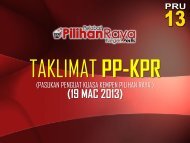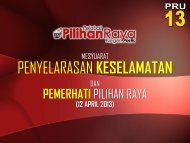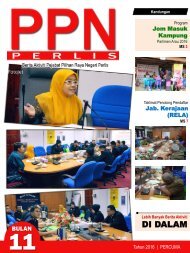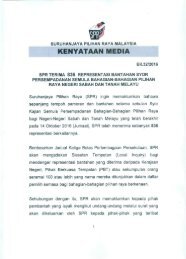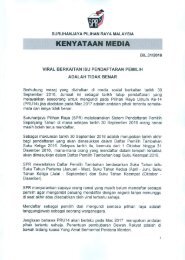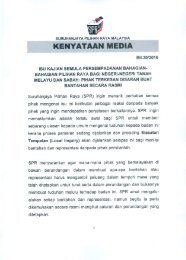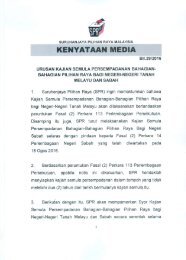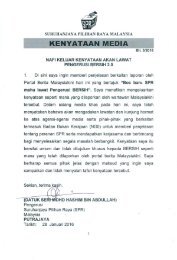2012 - THE ELECTORAL ROLL ISSUES AND CLARIFICATIONS.pdf
You also want an ePaper? Increase the reach of your titles
YUMPU automatically turns print PDFs into web optimized ePapers that Google loves.
<strong>THE</strong> <strong>ELECTORAL</strong> <strong>ROLL</strong>: <strong>ISSUES</strong> <strong>AND</strong> <strong>CLARIFICATIONS</strong><br />
Issue 1:<br />
More than three million non-residents found in the EC’s Electoral Roll<br />
The EC believes that those who claim there are more than three million nonresidents<br />
in the electoral roll are actually referring to electors who are no<br />
longer residing at their original address, that is, the address at the time of<br />
registration, which appears in the EC’s Main Electoral Roll.<br />
The EC does not deny the fact that there are many electors in the Main<br />
Electoral Roll who are no longer residing in the place where they originally<br />
registered. In fact, there are many such electors in the EC’s electoral roll.<br />
Though they may have moved to a different place, they failed to submit<br />
application to the EC for change of address in the electoral roll. As a result, it<br />
is possible that these electors will return to their respective constituencies to<br />
cast their votes on polling day. It is also possible that they will not return to<br />
their original constituency to vote because of the long distance to their original<br />
polling centres.<br />
This scenario has motivated some parties to classify these electors as "nonresident<br />
votes'. In fact, some other parties are more prone to label these<br />
voters as 'phantom voters' just because these voters suddenly turn up on the<br />
polling day to cast their vote at the polling centre in the area where they<br />
originally registered as an elector.<br />
In this context, the EC would like to stress that it has no direct authority to<br />
compel the electors who have moved to their new places of residence to apply<br />
for change of address and thereby polling centres. What the EC can do is to<br />
advice electors who have moved to their new places of residence to change<br />
their address with the National Registration Department and apply for change<br />
of address and polling centre to the EC.<br />
The fact is that an elector is free to retain his original address and therefore<br />
his polling centre at the time of his registration or he may choose to apply for<br />
change of address that will result in a different polling centre based on his<br />
current address. As long as an elector choose not to apply for a change of
address (and polling centre), the EC has no right or the authority to change his<br />
address or his polling centre.<br />
With regards to this issue, the electors must also be aware that changing their<br />
residential address at the National Registration Department does not mean<br />
that their address in the electoral roll at the EC would be automatically<br />
updated as well. Change to an elector’s address in the electoral roll and his<br />
polling centre is only possible through an application for change of address<br />
from that elector to the EC.<br />
Based on this explanation therefore, the claim that supposedly there exist<br />
non-resident electors in the electoral roll is not an issue and does not conflict<br />
with the laws. Thus, such claim should not be raised and be politicized by<br />
certain parties to dispute the validity and credibility of the EC’s electoral roll.<br />
Issue 2:<br />
42,054 electors who have not renewed their MyKad are still in the EC<br />
electoral roll<br />
The EC undertook serious efforts through various means to resolve the<br />
problem of about 42,000 electors who have not renewed their MyKad as this<br />
has resulted in the EC not been able to obtain the most current information<br />
about them.<br />
The names of these electors were on display for four months. Initially it was<br />
from October to December 2011 and at the request of the Parliamentary
Select Committee on Improvements to the Electoral Process, it was on display<br />
for another month, that is, January <strong>2012</strong>. However, the display of these<br />
names did not yield the expected results. Up until early May <strong>2012</strong>, only 1,496<br />
electors had come forward to the National Registration Department to replace<br />
their old identity cards with the new MyKad while there were some who had<br />
come to update the Department on the death of their relatives. The EC<br />
believes that it is possible that those who registered in the 1960’s and 1970’s,<br />
especially those living in remote areas, may have died by now.<br />
The Electoral Roll Technical Committee Meeting held on 8 May <strong>2012</strong> between<br />
the Ministry of Home Affairs, the Attorney General’s Office, the National<br />
Registration Department and the EC, confirmed that the records of the<br />
remaining 40,558 names are still in the database of the National Registration<br />
Department. Therefore, under the existing laws, these names cannot be<br />
removed from the electoral roll.<br />
In this regard, the EC would like to reiterate to the public that the existing<br />
election laws does not allow the EC to delete the name of any elector from the<br />
electoral roll indiscriminately without confirmation from the responsible<br />
authority, that is, the National Registration Department. It is this department<br />
that confirms if an elector is dead, has lost his citizenship or has lost his<br />
eligibility to be an elector for other reasons as stated in the Federal<br />
Constitution. As a result, the names of these electors will continue to remain<br />
on the electoral roll to ensure that their rights as electors are fully guaranteed<br />
under the Federal Constitution. At the same time, the EC will continue with its<br />
efforts to undertake continuous checking to update the records of these<br />
electors in the Electoral Roll.<br />
Issue 3:<br />
The EC’s electoral roll contains information on gender that is<br />
inconsistent with that in their respective identity cards<br />
It cannot be denied that there is a general perception that a male will have an<br />
odd number as his last digit in his 12-digit MyKad number. Similarly, for<br />
female MyKad holder, the general perception is that the last digit in the 12-<br />
digit number would be an even number. In reality, this is not the case. A male<br />
can have an even number as his last digit and a female can have an odd<br />
number as his last digit.
The EC sought the assistance of the National Registration Department to<br />
explain this so-called inconsistency. The National Registration Department<br />
has informed the EC that when issuing 12-digit identity card numbers, it is not<br />
necessary to issue numbers that end with an odd number for males and even<br />
number for females. In other words, it is normal for a male to have an even<br />
number as the last digit of his 12-digit number in his MyKad. Similarly, a<br />
female can have an odd number as the last digit of his 12-digit identity number<br />
in her MyKad.<br />
The EC registers an elector based solely on his identity card number and the<br />
address stated in the identity card, which must be the same as in that in the<br />
system of the National Registration System (ALiS). As long as the identity<br />
card presented to the EC is valid, that is, it was issued by the National<br />
Registration Department, the registration system at the EC will accept it and<br />
use the information contained in the identity card as valid information to<br />
ascertain the address of the elector.<br />
Therefore, the EC hopes that the public will understand the facts behind such<br />
claim believed to have resulted from the lack of understanding among certain<br />
parties as to the work procedures at the National Registration Department and<br />
the EC. The former is responsible for issuing identity cards to the citizens and<br />
the latter is responsible for the registration of citizens as electors whenever<br />
they<br />
apply.
Issue 4:<br />
The EC’s electoral roll still has electors with incomplete addresses even<br />
though they are residing in developed states such as Selangor and<br />
Kuala Lumpur<br />
It is the objective of the EC to have an Electoral Roll with complete current<br />
addresses for all the approximately 13 million registered electors in the<br />
country. Unfortunately, the situation at the ground level does not allow the EC<br />
to do so.<br />
It is a known fact that despite the rapid development and urbanization in<br />
several states such as in Selangor and Kuala Lumpur, there remain areas that<br />
have not fully benefitted from the process of urbanization. These include<br />
squatter areas and areas leased for temporary occupation. In these areas,<br />
each house is not given a unique number. They merely use the names of the<br />
roads. In fact, in these areas the use of surrogate address is quite common.<br />
The nearby residents or residents living in an area often use the address of<br />
premises such as a coffee shop for the purpose of correspondence.<br />
In addition to this, a study by the EC showed that applicants completing the<br />
application forms for registration as well as relatives and others who helped to<br />
complete the application forms did not give the complete address of the<br />
applicants, especially applications for registration prior to July 2002. At that<br />
time, the EC too did not see the need for a complete address as a priority<br />
when processing applications for registration since the format of the<br />
addresses then were in different forms, there were those that were complete<br />
and others that were too general.<br />
The EC would attempt to identify and complete the information that they have<br />
of new electors, including their addresses, in the Main Electoral Roll. In this<br />
regard, the EC has stepped up its efforts to get the complete addresses of<br />
electors by conducting checks on the ground in the affected areas as well as<br />
create a special facility on its website that provide the opportunity for electors<br />
to update the information on their respective addresses.
Issue 5:<br />
There are voters with similar names, and sometimes the same date of<br />
birth in the Electoral Roll<br />
With nearly 13 million electors in the electoral roll, it is normal to have electors<br />
with similar names and even the same date of birth in this country, especially<br />
among the Malays and the Muslims.<br />
A quick search of the electoral roll by the EC showed that several electors had<br />
the same name. For example, there were 15 electors with exactly the same<br />
name, Abdul Aziz bin Mohd Yusof. The same applies to Wan Ahmad bin Wan<br />
Omar. There were 10 electors with exactly the same name. There was<br />
absolutely no difference even in the spelling of these names.<br />
The EC found the claims that there were electors with very similar names with<br />
the same dates of birth to be true. However, further checks by the EC showed<br />
that there were different individuals and were not ‘clones’ or ‘duplicates’ as<br />
claimed by some parties.
Issue 6:<br />
The EC’s Electoral Roll contains many voters who hold identity cards<br />
with the figure "71"<br />
Code ‘71’ is the two-digit number stated in the identity card issued to<br />
Malaysians born overseas and also given to foreigners granted Malaysian<br />
citizenship. As far as the EC is concerned, anyone confirmed to be a<br />
Malaysian citizen as evidenced by the identity card issued by the National<br />
Registration Department is eligible and is entitled to apply for registration as<br />
an elector and to vote during the elections in this country.<br />
It is impossible for non-citizens and foreigners to be registered as electors.<br />
This is because any application by a citizen who is eligible to register as an<br />
elector will have to go through rigorous computerized screening process.<br />
These screening procedures are in accordance with the laws. Hence, the<br />
issue of the citizenship background does not arise when applying for<br />
registration as an elector as long as he has a valid identity card, has attained<br />
the age of 21 years and above, as well as fulfilling others criteria stipulated<br />
under the Constitution.<br />
Issue 7:<br />
The Electoral Roll has numerous voters aged 85 years and above, even<br />
those who are more than 100 years of age<br />
According to EC’s records, there are still many electors in the electoral roll<br />
who are 85 years and above. These electors are eligible to vote during the<br />
elections including the upcoming 13th general election.<br />
Old age is not a criterion that can be used indiscriminately by the EC to delete<br />
names of electors from the Main Electoral Roll. Any action to delete the name<br />
of a registered elector from the electoral roll can only be done upon specific<br />
reasons such as when an elector has passed away subject to verification by<br />
the National Registration Department or when the citizenship of the elector<br />
has been withdrawn by the Government of Malaysia.<br />
Therefore, although the age of an elector may be over 100 years, the existing<br />
laws do not allow the EC to delete his name arbitrarily from the electoral roll
on the assumption that he may have died. Therefore, if anyone knows and<br />
can prove that one or more relatives are dead, the EC hopes that he would<br />
proceed to the National Registration Department to update the records of the<br />
deceased.<br />
After receiving information on the death of an individual, the National<br />
Registration Department will pass on that information to the EC for it to delete<br />
the name of the individual from the electoral roll, if he is a registered elector.<br />
The EC depends fully on the information provided by the National Registration<br />
Department to confirm the death of a citizen to prevent fraud and the likes.<br />
Issue 8:<br />
The EC’s Electoral Roll has too many postal voters from amongst the<br />
wives of the armed forces and the police personnel<br />
As provided for under the Election Regulations (Postal Voting) 2003, the wife<br />
or husband of the armed forces personnel is entitled to vote by post.<br />
According to Regulation 3(1)(a) “any person who has registered as an elector<br />
of Parliament or the State under the Election Regulations (Registration of<br />
Electors) 2002, and he who is a voter that is not present, shall be entitled to<br />
vote as postal voters”.<br />
According to the Election Regulations (Postal Voting) 2003, members of the<br />
Police Force and the Police General Operations Force including the latter’s<br />
spouses are eligible to vote by post. This is clearly stated under sub<br />
regulation 3(1)(c) and (f) of the law.<br />
Thus, the presence of a large number of postal voters from among the wives<br />
of of the Armed Forces and the Police General Operations Force personnel in<br />
the electoral roll is a normal phenomenon and should not be a matter of<br />
dispute by any party.<br />
At the EC, applications for registration as postal voters from these two<br />
categories of electors (spouses of the Armed Forces and the Police General<br />
Operations Force personnel) is processed carefully to avoid double<br />
registration among them wherein the EC ensures that a postal voter’s name<br />
does not appear in the list of ordinary voters as well.
However, following the amendment to the Election Regulations (Conduct of<br />
Elections) (Amendment) (No. 2, <strong>2012</strong>), which was made on 27 April <strong>2012</strong> and<br />
came into force on 30 April <strong>2012</strong>, all Armed Forces personnel and their<br />
spouses, the Police General Operations Force personnel and their spouses<br />
and the Police will be voting in advance. Members of the Armed Forces, the<br />
Police and the Police General Operations Force who are on operational duty<br />
far away from their polling centres are allowed to apply to be absent voters<br />
and are thus able to vote by post.<br />
Issue 9:<br />
The Electoral Roll has many new electors from the army and the police<br />
who are over the age of eligibility for intake into the Armed and Police<br />
Forces i.e., 28 years<br />
It is true that there are new electors in the electoral roll from the Armed and<br />
Police Forces who are over the age of 28 years though the maximum age for<br />
intake into these Forces is 28 years. This is because the Armed Forces did<br />
recruit its personnel through what is referred to as absorption from among<br />
members of the Border Regiment, commonly referred to as the Territorial<br />
Army (Askar Wataniah). When these individuals were absorbed into the<br />
Armed Forces, they were already above the eligibility age.<br />
As for the Police Force, there were new electors in the roll who were above<br />
the eligibility age of 28 years for recruitment into the Force as the Royal<br />
Malaysian Police Force had recruited from among former soldiers who had<br />
completed their short-term services with the Army. The average age of these<br />
former soldiers when they applied to join the Police Force was above 30<br />
years.
In addition to the above reasons, there are also members of the Royal<br />
Malaysian Police Force who are late registrants as they apply for registration<br />
as an elector much later after joining the Police Force.<br />
It is because of the above circumstances that we have some new electors<br />
whose age may have exceeded the eligibility age of 28 years for recruitment<br />
into the Armed and Police Forces.<br />
Issue 10:<br />
The Electoral Roll still has many electors from amongst members of the<br />
Armed and Police Forces who have already passed the retirement age<br />
The election laws clearly stipulate that any change to the status of an elector<br />
in the electoral roll must be initiated by the elector himself. The EC cannot on<br />
its own effect any changes indiscriminately to the information about an elector<br />
without a formal application from the elector concerned.<br />
In this respect, if there are members of the Armed and the Police Forces who<br />
have completed their services but failed to apply to request change in their<br />
status from absent voters to ordinary voters, their status will remain<br />
unchanged in the Electoral Roll even though they may have retired from the<br />
service.<br />
A retired member of the Armed Forces or the Police Force, who did not apply<br />
to change the status of his registration from an absent voter to an ordinary<br />
voter, will not be able to vote as an ordinary voter as his name will still appear<br />
under the list of absent voters. In such cases, the electors concerned will be<br />
at the losing end since they cannot vote, as absent voters or as ordinary<br />
voters. They cannot vote as absent voters as they have retired from the<br />
Armed Forces or the Police Force. On the other hand, they cannot vote as<br />
ordinary voters as their names still appear under the list of absent voters.<br />
Currently, concerted effort is being undertaken by the Armed Forces and the<br />
Royal Malaysian Police Force to ensure that each of their members who retire<br />
immediately submit their application for change of status, from an absent voter<br />
to an ordinary voter. In this respect, the EC has been made to understand<br />
that the Remuneration Division of both the Forces have begun to include Form<br />
A (Application for Registration) along with other documents to their members
who are about to retire to enable them to apply for change of status, from an<br />
absent voter to an ordinary voter. With this procedure in place, the EC hopes<br />
to reduce the problem of having members of the Armed Forces and the Police<br />
Force who have long retired still in the list of absent voters.<br />
Election Commission of Malaysia


